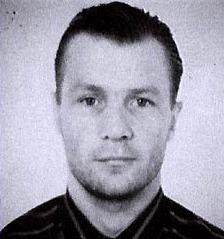Prehistory
On the night of June 18, 1997, when Dovzhenko was already serving in the militia, the office of his former employers, the Citadel, was attacked. A security guard, Sergei Mitchenko, was killed and ₴5,000 disappeared from the safe. At the crime scene, cartridges were found from a PM pistol. Suspicion fell on Dovzhenko. On June 27, 1997, he was arrested in the workplace. Examination of the service weapon Dovzhenko used proved that the victim was killed with it. Dovzhenko accepted help from his brother Valery, the director of a law firm in Mariupol, and proved his innocence. [2] Based on the results of a repeated examination in Kyiv, Dovzhenko was able to prove that the first one was fabricated. [3] During the investigation, Dovzhenko was in custody for eight months, when on March 30, 1998, he was released, but was also fired from the internal affairs authorities for forgery of documents (falsified entry in the workbook). According to his lawyer, Dovzhenko repeatedly tried to get a job, including in law enforcement, but officials continually denied him, allegedly provoking the conversion of Dovzhenko into a serial killer. [4] The former policeman decided to take revenge on his offenders.
Murders
According to Dovzhenko, his first victim was the former owner of the Citadel, Vladimir Chekmak, who was the first to suspect that an employee had caused the attack in the firm's office. According to Dovzhenko, he watched Chekmak for about a month. On November 19, 1998, Dovzhenko allegedly made his way to the victim's house and put on his police uniform he brought with him in a nearby entrance. When Chekmak arrived by car and opened the front door, Dovzhenko shot him from the edge of 12-caliber gun. Since Chekmak was still alive, Dovzhenko cut his throat with a knife, then turned towards Chekmak's friend, Igor Karimov, whom he allegedly mistook for the head of the personnel department of the Citadel, and also killed him. In addition, the driver Andrei Lyubichov and the commercial director of the Citadel Sergei Shaturov, who were also in the car, were injured. That same night police officers came to Dovzhenko, but they found nothing during the search, and Dovzhenko's wife also confirmed his alibi.
After this, Dovzhenko decided to take revenge on his former co-workers. By committing murder, he hoped to worsen the disclosure rates and thereby achieve the dismissal of responsible police chiefs.
The killer's next victim was Valentina Gladilina, who sold perfumes at a street market. On April 17, 1999, after changing into a police uniform, Dovzhenko met Gladilina at the entrance of her house and presented a fake ID of a police officer. She felt that Dovzhenko wanted to talk to her about a theft in her house and invited him in. Dovzhenko killed her and robbed a thousand dollars from the house. For this murder, Dovzhenko used a pistol, bought from his friend Vitaly Shemyakov. Its feature was the presence of five rifling instead of the standard four.
The same weapon was used in the murder of a militia captain named Alexander Kokin and his wife Ekaterina on June 27, 1999. The mother-in-law of the captain, Galina Krokhaleva, was also wounded. According to her testimony, Dovzhenko was with an accomplice.
Subsequently, Dovzhenko simplified the scheme for selecting victims—he bought newspapers with ads and was looking for offers where it was reported about the sale of expensive things. Having determined where the seller lives and to whom of his former colleagues, accordingly, the investigation of the crime scene will take place, he was preparing for the murder, and he took money and property to "feed".
On September 10, 1999, Dovzhenko killed Lyudmila Shevchenko and her son Sergei. She had given an advertisement in the newspaper about the sale of a video camera.
On December 13, 1999, Ivan Vakulenko and his son Vitaly, who were trying to sell a computer, were killed.
On July 7, 2000, Dovzhenko killed his friend Vitaly Shemyakov. Shemyakov, following the chronicles of events in the press, drew attention to the "atypicality" of the murder weapon (a pistol with five cuts). He knew that this is exactly what he sold to Dovzhenko in 1999. Shemyakov began blackmailing Dovzhenko, demanding large sums of money in exchange for his silence. Dovzhenko then came to his friend's house and slit his throat.
On December 15, 2000, Dovzhenko shot down a police patrol. Police officers Alexander Rogovets, Vladimir Fedorenko and Andrei Karpenko tried to detain Dovzhenko while he was hiding a gun in the front of his shirt. Approaching them, he opened fire simultaneously from the cut-off and the pistol, then finished off the wounded on the ground, taking one of them out with a pistol.
At this time, for the murder of Vitaly Shemyakov, a man named Yegorov was convicted. Shemyakov's mother, Claudia Bondarenko, did not believe the physically weak Yegorov could deal with her son. In addition, she supported the version of the press that the killer was a former soldier or policeman. Sooner or later, she may have suspected a friend of her son—Sergei Dovzhenko. The murderer decided to get rid of Bondarenko. On June 27, 2001, Dovzhenko killed Claudia Bondarenko at her home. To ward off suspicion, he staged an assault with a robbery of Bondarenko's neighbors, during which he killed Galina Ivanova and her 12-year-old granddaughter Tanya. Dovzhenko took 3 thousand dollars from their apartment.
On May 17, 2002, Dovzhenko killed Artur Frolkov and Atso Simovich, who announced that they were selling a laptop.



